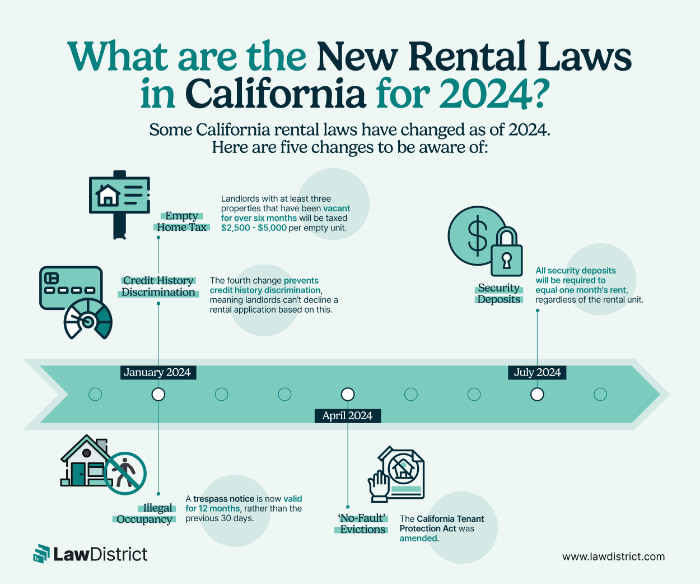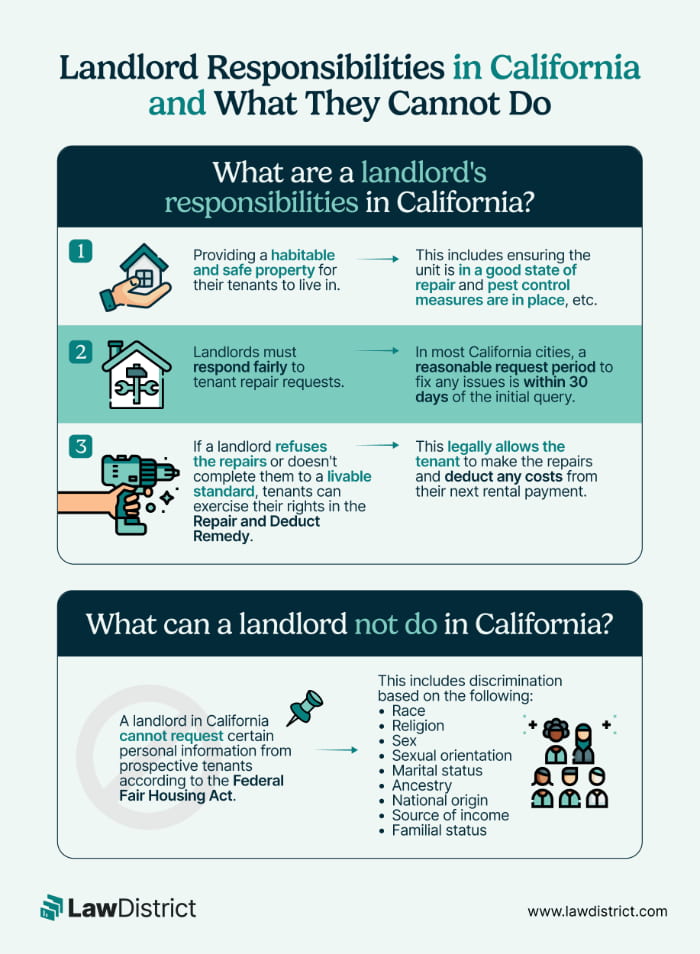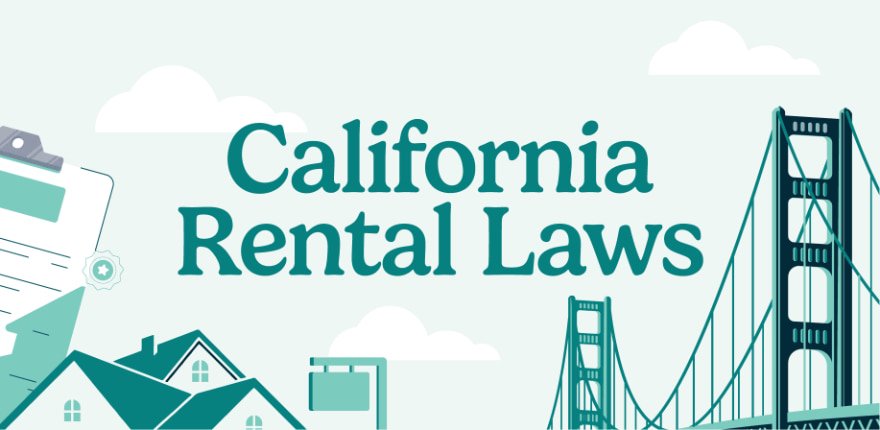Key Takeaways:
- Security deposits now amount to one month’s rent.
- If a homeowner ends a tenancy to move into the property, they have to move in within 90 days of the tenant moving out.
- Squatters do not have the right to occupy a property in California.
Anyone will tell you that being a landlord comes with a lot of responsibility. But, being a successful landlord means you need to be aware of the laws and regulations attached to renting out properties.
In the US, plenty of laws apply state-wide, from landlords being prohibited from entering properties without giving proper notice, to ending tenancies before the lease expires if no issue has ever been raised.
But, some laws don’t apply to all states, meaning you’ll need to research the do’s and don’ts in your specific rental area. In this article, we’ll be focusing on California rental laws for those who need to navigate The Golden State’s legal landscape.
We’ll cover everything you need to know about the largest cities in California to ensure your landlord journey is a smooth one. We’ll also provide you with the knowledge to succeed in this ever-changing industry.
What are the New Rental Laws in California for 2024?
Some California rental laws have changed as of 2024, so you must be aware of any updates or adjustments. Here are five changes to California tenancy laws:

| Security Deposits
|
As of 1 July 2024, all security deposits will be required to equal one month's rent, regardless of the rental unit.
|
| ‘No fault evictions’
|
On 1 April 2024, the California Tenant Protection Act was amended. It changed the rules around “no fault” evictions or termination of a residential lease agreement. For example, if a homeowner wants to end a tenancy to move into the property, or commission a major remodel, more details and co-operation are required from the landlord. For the former, this includes moving in within 90 days of the tenants moving out, and remaining in the property for at least 12 months before being able to put it back on the rental market. For the latter, details of the work need to be disclosed to the tenants, including providing them with copies of signed contracts or permits that state the work is allowed to be done. The landlord must allow the tenants to move back in if the work doesn't go ahead.
|
| Illegal occupancy
|
In terms of illegal occupancy, landlords can now tell local law enforcement of any empty properties they own. Should a trespasser live in the property, law enforcement officials have the right to remove them. As of 1 January 2024, a trespass notice is now valid for 12 months, rather than the previous 30 days.
|
| Credit history discrimination
|
1 January 2024 was a busy day for new California tenant-landlord laws. The fourth change prevents credit history discrimination, meaning landlords can’t decline a rental application based on this. Landlords must also give applicants a reasonable amount of time to provide essentials such as benefit statements, pay records or bank statements, while also reasonably considering their credit history when deciding whether to offer them the tenancy.
|
| Empty home tax
|
Again on 1 January 2024, San Francisco introduced an ‘empty home’ tax. Landlords with at least three properties that have been vacant for over six months will be taxed $2,500 - $5,000 per empty unit. The funds collected will be invested in subsidizing affordable housing in the Bay area, especially for those over 60.
|
What is Included in a Lease Agreement in California?
A California lease agreement includes numerous clauses that protect both the landlord and the tenant. This requires the full names of the landlord and property management agents, plus their contact information. It also includes the rental property address, the rent amount (monthly), and the duration of the lease. Additionally, California rental agreements require security deposits, late fees, and rental terms for payment.
California rental agreement laws should also include non-negotiables such as lead-based paint disclosure for older properties, pest control policies, and the US federal law, Megan's Law, which requires ‘law enforcement authorities to make information available to the public regarding registered sex offenders.’
Rental leases will need to provide rules surrounding rent limits, withholding rent for repairs, and procedures for notifying tenants about rent increases, lease violations, or any other major changes.
Landlord Rights and Responsibilities in California
Here, we cover landlord rights and responsibilities in California. Read carefully to ensure you’re aware of any changes.
What are the Landlord's Rights in California?
According to the California Civil Code , which is made up of ‘statutes that govern the general obligations and rights of persons within the jurisdiction of California,’ all landlords have the right to collect rent, evict a tenant in the event of an agreement breach, withhold the security deposit in case of property damages, and enter their properties for emergencies.
Landlord rights in California also allow the homeowner to schedule repairs and maintenance, book viewings (provided substantial notice is given to the tenants) and govern rent control. Even though the California Tenant Protection Act has imposed caps on rent increases, it also outlines that landlords have rights within their boundaries.
What are the Landlord's Responsibilities in California?
Just as landlords have plenty of rights, they also have many responsibilities. The most important ones include:
- Providing a habitable and safe property for their tenants to live in (this includes ensuring the unit is in a good state of repair and pest control measures are in place, etc.)
- If the tenant requests a repair within the property, landlords must respond fairly. Think of it this way: if you wouldn’t like to live in the unit in its current state, it’s likely no one else will. In most California cities, a reasonable request period to fix any issues is within 30 days of the initial query.
- If a landlord refuses the repairs or doesn't complete them to a livable standard, tenants can exercise their rights in the Repair and Deduct Remedy. This legally allows the tenant to make the repairs and deduct any costs from their next rental payment.

Tenants Rights and Responsibilities in California
Just like landlords have rights and rules to adhere to, tenants also have to comply with regulations. Renters rights and responsibilities in California include:
What are the tenant's rights in California?
Similar to the landlord responsibility point, California tenants have the right to live in a habitable and safe property. Should the unit not meet the minimum health and safety standards, tenants have the right to sue the landlord, withhold rent until the essential services are provided, and recover attorney fees should the dispute require legal action.
In San Francisco, the majority of tenants are covered by the San Francisco Rent Ordinance, which provides just cause for eviction and rent control. Previously, buildings that contained two or more units built before 1979 were covered under the Ordinance. But, as of January 2020, almost all San Francisco properties - regardless of unit number or construction dates - are protected.
Further south in San Diego, the City Council approved legislation in 2023 that called for stricter renter protection. The legislation now states that landlords must provide relocation assistance to their tenants for no-fault evictions.
What are the Tenant's Responsibilities in California?
Are you curious about the tenant responsibilities in California? Here are the most common typically found in California rental agreements.
- It is the tenants’ responsibility to keep the rented property in a safe and habitable condition.
- Tenants must respect their neighbors and fellow housemates.
- The tenant must do any small, easy repairs that don’t cost money.
- Pay rent on time.
- Comply with the lease agreement and any additional clauses that were agreed upon by the tenant and the landlord.
California Landlord-Tenant Rental Laws
Now for the California landlord-tenant law section. This governs various aspects of the landlord-tenant relationship and is put in place to ensure that the contract between either party is respected. Here are some key features you’ll need to be aware of as a landlord:
Homeowners are allowed to vet any prospective tenant, but it must be done through a rental application process. In some instances, this applicant will be required to pay a fee to cover things like consumer credit reports and personal reference checks.
However, as of April 2024, under the California Civil Code Section 1950.6(b), application fees have been capped at $65.37 per applicant, meaning this is the maximum a landlord can charge, even if it’s going to cost more. This fee is annually adjusted in correlation with the Consumer Price Index, which ‘measures change over time in the prices paid by consumers for a representative basket of goods and services.’
Additionally, unit owners must also obey Section 1950.6 of the California Civil Code in terms of the fees. Part of the section reads: ‘The amount of the application screening fee shall not be greater than the actual out-of-pocket costs of gathering information concerning the applicant.’
Even though a landlord can legally collect these fees, the homeowner is required to provide a receipt of all the necessary checks to the applicant. Elsewhere, if the applicant is not screened, or the screening costs are less than the fee, the applicant is legally obliged to receive a refund.
Meanwhile, what a landlord cannot do in California is request certain personal information from prospective tenants that aligns with the Federal Fair Housing Act. This includes discrimination based on the following:
- Race
- Religion
- Sex
- Sexual orientation
- Marital status
- Ancestry
- National origin
- Source of income
- Familial status
As we touched on earlier, while landlords do have the right to perform screening checks within reason, it’s important to be aware of local ordinances that might enforce further restrictions. An example of this is Oakland's ban on criminal background checks.
How much can the landlord raise the rent in California?
In California, rent increases are capped by the Tenant Protection Act for most residential properties. This means landlords are prohibited from raising the rent by more than 10% total or 5% + CPI increase over 12 months.
In Los Angeles, the city’s Rent Stabilization Ordinance was set at 4% in 2024. This limits annual rent rises for rent-stabilized units by law.
How can I complain about a landlord in California?
There are multiple ways tenants can complain about their landlords in California. For small issues that are likely to be resolved easily, we recommend speaking directly to the landlord.
For example, if the tenant has never previously had problems with the property, and has been on good terms with the landlord since the start of the lease, but now has complaints over things like communal spaces, an email to the homeowner addressing these issues is the best way to go. Emails are advised in these circumstances, as you’ll always have a paper trail should things need to be disputed in the future.
On a more serious note, The State of California Department of Consumer Affairs can assist with complaints regarding landlord/tenant relationships. Typically this is reserved for issues like safety violations, repair problems, etc.
Alternatively, tenants can contact The California Civil Rights Department of Fair Employment and Housing (DFEH). This department deals with enforcing California’s fair housing laws, which apply directly to landlords. Plus, other professionals like mortgage lenders, builders, real estate agents, etc.
It’s advisable to contact the DFEH if a tenant has experienced issues such as harassment, retaliation, or housing discrimination.
Do squatters have rights in California?
Again, this is something we covered earlier. But in terms of California rental laws, squatters have no legal right to occupy a property even if the unit is vacant. Therefore, homeowners have the right to seek legal action to evict squatters from their property or land.
Become a successful California landlord in 2024
Hopefully, you’re feeling much more equipped and knowledgeable to successfully manage your rental properties. From adhering to the new security deposit law, to being aware of the 2024 California Tenant Protection Act of 2019 amendment, it’ll make for many smooth landlord-tenant relationships.
Helpful Resources:
Tenant Protection Act Landlords and Property Managers - OAG CA
Rental Housing Law 2024 - CANNET
SB-267 - California Legislation Info
California Civil Code - California Legislation Info




